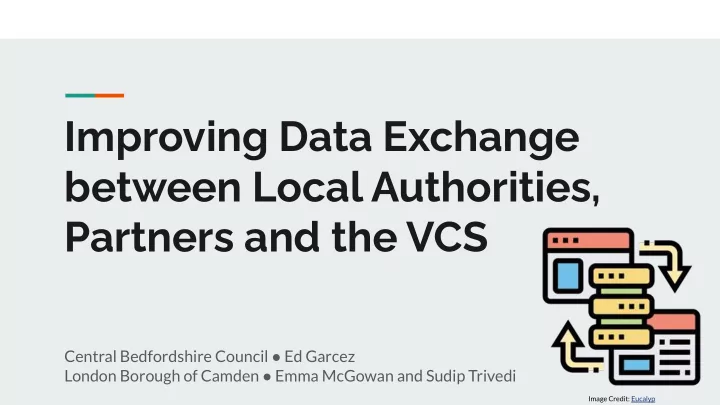

Improving Data Exchange between Local Authorities, Partners and the VCS Central Bedfordshire Council ● Ed Garcez London Borough of Camden ● Emma McGowan and Sudip Trivedi Image Credit: Eucalyp
The C19 challenge ● This has been a fast changing context, with much outside of our control ● We have needed to support new, often complex needs ● We have needed a ‘system-wide’ and relational approach ● We have needed to respect individual privacy while enabling shared insight and working ● We have had to understand assets and strengths in our communities ● Introducing new ways of working, and working together across boundaries, a new model for meeting needs enabling Councils and their VCS partners to better reach groups and individuals
Building on work to date ● Our bid looks to build on some of the challenges and opportunities . A key reflection through C19 challenge has been need for councils and VCS partners to work better together in order to meet needs of residents and communities ● We will use and build on the work of others, and our outputs will be designed for others to do the same ● We will look to understand the challenges to better data sharing and particularly look at issues facing the VCS and partners - this has to consider culture and process as well as governance, exchange mechanisms and technology ● Through our work with partners we will seek to create a quick win prototype view of minimum sets of data that will allow us to see view of needs and map it against view of community strength (building on service directory style approach)
What we’ve heard our VCS partners say through C19 1. Help us anticipate changing needs so we can scale services accordingly 2. Desire to work together to understand who can help where and when 3. Don’t want to feel ‘handed off’ 4. Interest in the council triaging need and then working with the VCS and partners to meet it 5. Help us understand the types of need coming through the various front doors 6. Don’t make us use your systems / all the sector hears about us systems and platforms not what we need 7. Flexibility and responsiveness in operating models 8. Want to support residents regardless of the ‘front door’ they come through 9. There is a lot more to do going forward and relationally there is a big opportunity
Building on work to date Explore open Detail about a My to do list requests request Some personal details are hidden until a request has been accepted
Building on work done to date
Understanding needs and strengths beacon
Our agile and iterative plan to deliver ● Understanding challenges and obstacles, learning from each other Discovery ● Exploring the problems to be solved, defining scope for the 8 weeks ● Take a wide view that extends beyond data and technology Design, develop Addressing the obstacles, taking different perspectives ● ● Up to three challenge areas to explore across changed and prototype ways of working, critical datasets and prototypes ● Evaluating new ways of working, processes and Testing solutions with partnering organisations ● Getting user feedback and iterating designs Lessons learned/ Creating reusable outputs to facilitate take-up by ● other Councils and organisations templatising Templatising outputs to ease adaptation and reuse ●
Our team ● Delivery manager ● Service designer Discovery User researcher Analyst ● ● Design, develop ● Delivery manager ● Interaction designer ● Data lead and prototype Service designer Developer ● ● Delivery manager Developer ● ● Testing ● Interaction designer ● Data lead Lessons learned/ ● Delivery manager templatising Content designer ●
Working in the open together, and sharing ● We will be working in the open with partners, sharing as we go. All of our outputs will be open and we will build on open standards and existing solutions. ● By working with a range of partner organisations and across a number of council we will look to understand ‘universal’ obstacles and challenges and so to define generic and reusable solutions. ● We are working with, and will benefit from the support of LOTI who are experienced in templatising outputs so that they can be shared. A week at the end of the project will focus on ensuring this ● We will also be look to work with partners to test further iteration and reuse.
Measuring our success and impact ● Building on existing work, and benefiting from a head start ● Defining the problem in parts to ensure focus, and running parallel agile sprints across the partnering organisations to deliver at pace ● Focusing on tangible outcomes that will make a real difference to people’s lives, and that will deliver concrete insight and learning that can be built on ● Sharing a joint commitment to identifying our common problems and working together to solve them ● In the stages: ○ Discovery the extent of partner engagement ○ Design the extent of reusability of patterns, processes and prototypes ○ Testing the involvement of and feedback from colleagues ○ Lessons learned/ templatising the extent to which we have worked in the open ... and ultimately how much our outputs are taken on and iterated
Recommend
More recommend